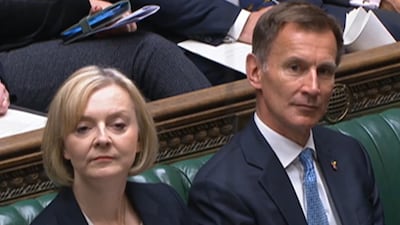UK retail sales have fallen 1.4 per cent — with food sales down 1.8 per cent — as the country's cost-of-living crisis begins to bite.
This comes as new research reveals that eight million people in Britain are struggling to pay their bills.
Data released on Friday by the Office of National Statistics showed that UK government borrowing has surged and retail sales slumped in September.
Public sector net borrowing stood at £20 billion ($22bn) — up £2.2bn on September 2021 and the second-largest September level on record — as decades-high inflation sees interest on debt repayments balloon.
The data comes one day after Liz Truss resigned as prime minister in the wake of turmoil in the financial markets triggered by her mini-budget of tax cuts funded by debt.
“Retail sales continued to fall in September after a weak August, and consumers are now buying less than before the pandemic, ONS director of economic statistics Darren Morgan said.
“Drops were seen across all main areas of retailing, with falling sales in food stores making the largest contribution.”
“Retailers told us that the fall in September was partly because many stores were closed for the Queen’s funeral, but also because of continued price pressures leading consumers to be careful about spending.”
A public holiday was held on September 19 to mark the funeral of Queen Elizabeth II.
Contenders bidding to succeed Ms Truss on Friday opened a hectic weekend of campaigning, but opposition parties demanded that UK voters get their own say to end months of political chaos, through a general election.
Ms Truss succeeded Boris Johnson on September 6, after a two-month leadership campaign that in the end saw her defeat rival Rishi Sunak — who is now a favourite to take over.
Former chancellor Mr Sunak had warned in the battle to succeed Mr Johnson that tax cuts promised by Ms Truss, when government debt had already soared on Covid-19 interventions, was the wrong policy.
He was proved right as the mini-budget sent the pound crashing to a record-low close to parity with the dollar and triggered yields on government bonds to soar.
That caused Ms Truss to U-turn on most of her planned tax cuts.
On Friday, sterling slid one per cent against the dollar, before recovering slightly, while the yield on the British government's 30-year bond climbed back above four per cent.
“Uncertainty in British politics remains rife, which will do little to inspire confidence in UK assets,” said Matthew Ryan, head of market strategy at global financial services firm Ebury.
Separate data on Friday showed British consumer confidence stuck near historic lows, despite a slight improvement this month.
“The weakness in retail sales and further overshoot of the government public borrowing forecast won't make the next prime minister's task any easier in navigating the economy through various crises,” said Ruth Gregory, senior UK economist at Capital Economics.
A survey by the Financial Conduct Authority regulator said that one in four adults in the UK were either in financial difficulty or would fall into trouble if they suffered a financial shock.
The FCA found that about 7.8 million people were finding it a burden to keep up with their bills, an increase of about 2.5 million people since 2020.
Several retailers — including Britain's biggest supermarket group Tesco and online fashion retailer Asos — have warned about the profit outlook this month, as they face higher energy and staff costs, plus a weak pound.
In annual terms, total sales volumes were down 6.9 per cent, the ONS said, the biggest fall since May 2020.
Carl Emmerson, deputy director of the Institute for Fiscal Studies think tank, said the deficit was in line with forecasts by Britain's official budget watchdog but would widen again soon as the government's expensive energy price subsidies begin.
He said borrowing this year could be almost £200bn — double the forecast of the Office for Budget Responsibility, the public body that provides independent analysis of the UK's finances.
Chancellor Jeremy Hunt is due to deliver a budget plan on October 31, which is likely to include spending cuts and tax increases.
“To stabilise markets, I've been clear that protecting our public finances means difficult decisions lie ahead,” Mr Hunt said after Friday's figures.
“We will do whatever is necessary to drive down debt in the medium term and to ensure that taxpayers' money is well spent, putting the public finances on a sustainable path as we grow the economy.”


